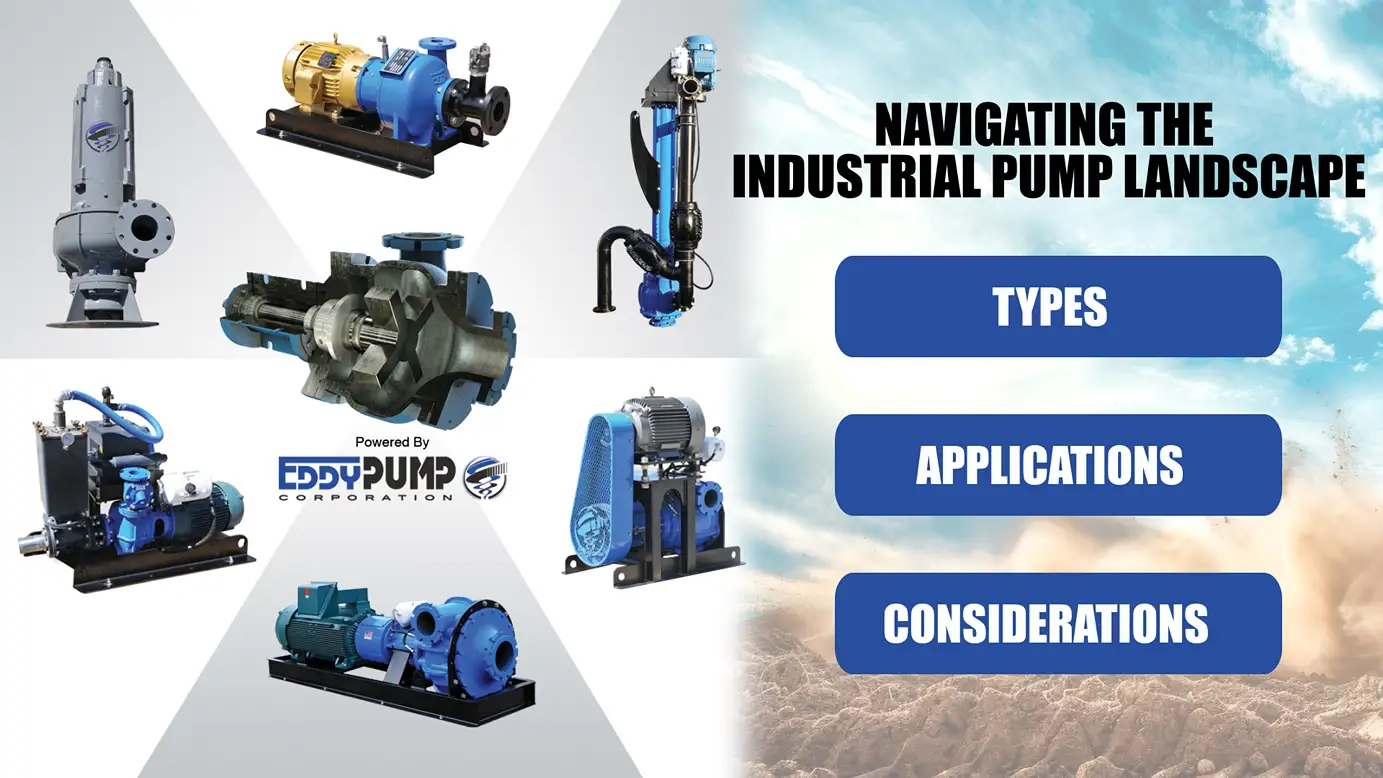Industrial pumps are essential components used in various industries to move fluids (liquids or gases) from one place to another. They play a crucial role in maintaining efficient operations, ensuring smooth processes, and achieving desired outcomes in numerous applications.
Image Source: https://eddypump.com/blog/industrial-pumps/
Importance in Industry: Without industrial pumps, many industrial processes would be unable to function effectively. They are used to handle a wide range of fluids, from clean water to harsh chemicals, and are integral to systems in water treatment, chemical processing, oil and gas, and more.
Types of Industrial Pumps
1. Centrifugal Pumps:
Centrifugal pumps use a rotating impeller to add velocity to the fluid, converting kinetic energy into pressure. They are widely used for handling water, chemicals, and other low-viscosity fluids.
2. Positive Displacement Pumps:
These pumps move fluid by trapping a fixed amount and forcing it into the discharge pipe. Common types include gear pumps, diaphragm pumps, and screw pumps. They are suitable for high-viscosity fluids and applications requiring precise flow rates.
3. Gear Pumps:
Gear pumps use meshing gears to pump fluid by displacement. They are known for their reliability and are often used in lubrication systems and hydraulic applications.
4. Diaphragm Pumps:
Diaphragm pumps use a flexible diaphragm to move fluids. They are ideal for handling corrosive or abrasive liquids and are commonly used in chemical and pharmaceutical industries.
5. Peristaltic Pumps:
Peristaltic pumps operate by compressing a hose or tube to push the fluid through. They are particularly useful for handling shear-sensitive or viscous fluids and are often used in medical and food processing applications.
6. Screw Pumps:
Screw pumps use one or more screws to move fluid along the pump. They are efficient for handling viscous fluids and are often used in applications like oil and gas extraction and heavy industry.
Other:
This category includes less common types such as peristaltic pumps and screw pumps, each designed for specific fluid handling needs. For more detailed insights on various industrial pump types, including these specialized options, explore this comprehensive guide on industrial pumps.
Applications of Industrial Pumps
1. Water and Wastewater Treatment:
Pumps are used to move water through treatment processes, from initial intake to filtration and distribution. They are crucial for maintaining clean water supplies and treating wastewater.
2. Chemical Processing:
In chemical processing, pumps handle a variety of chemicals, including corrosive, hazardous, and high-temperature fluids. They ensure precise dosing and mixing of chemicals in production.
3. Oil and Gas:
Pumps are used in various stages of oil and gas extraction, refining, and transportation. They handle crude oil, natural gas, and byproducts, often under high pressure and temperature.
4. Food and Beverage:
In the food and beverage industry, pumps are used to move ingredients, fluids, and products. They must meet stringent hygiene standards and be capable of handling a range of viscosities and temperatures.
5. Pharmaceuticals:
Pumps in the pharmaceutical industry are used for precise dosing, mixing, and transferring of medications and chemicals. They must comply with strict regulatory standards and ensure contamination-free operation.
6. Mining and Metals:
In mining and metals, pumps handle slurries, acids, and other abrasive materials. They must be robust and durable to withstand harsh conditions and maintain operational efficiency.
7. HVAC Systems:
Pumps in HVAC systems circulate heating and cooling fluids through systems to maintain desired temperatures. They are integral to ensuring effective climate control in buildings.
Considerations for Choosing an Industrial Pump
Flow Rate and Pressure Requirements:
Determine the required flow rate and pressure for your application to select a pump that meets these specifications. Under-sizing or over-sizing can lead to inefficiencies and operational issues.
Fluid Characteristics:
Consider the properties of the fluid being pumped, including viscosity, temperature, corrosiveness, and abrasiveness. Different pump types are suited to different fluid characteristics.
Efficiency and Energy Consumption:
Evaluate the pump’s efficiency and energy consumption to ensure cost-effectiveness. Higher efficiency can lead to reduced operating costs and lower environmental impact.
Maintenance and Reliability:
Choose a pump with a reputation for reliability and ease of maintenance. Regular maintenance is crucial for minimizing downtime and extending the pump’s lifespan.
Cost and Budget:
Balance the initial cost of the pump with its long-term operational and maintenance costs. Investing in a higher-quality pump can lead to better performance and lower overall costs.
Installation and Maintenance Tips
Installation Guidelines:
Follow manufacturer guidelines for installation to ensure proper operation. This includes correct alignment, securing connections, and checking for leaks.
Routine Maintenance:
Perform regular maintenance checks, including inspecting seals, bearings, and impellers. Replace worn parts as needed and follow recommended maintenance schedules.
Troubleshooting Common Issues:
Common pump issues include cavitation, leaks, and performance drop. Troubleshoot by checking for blockages, ensuring proper lubrication, and verifying system pressure.
Future Trends in Industrial Pumps
Technological Advances:
Emerging technologies, such as smart pumps with IoT capabilities, are improving monitoring and control. Advances in materials and designs are enhancing pump performance and durability.
Sustainability and Eco-Friendly Options:
There is a growing focus on sustainability, with developments in energy-efficient pumps and materials that reduce environmental impact. Look for pumps that meet environmental regulations and contribute to green initiatives.
Conclusion
Industrial pumps are vital to many industrial processes, and choosing the right type for your application is crucial for efficiency and reliability. Understanding the various types, applications, and considerations helps in making an informed decision.
Final Recommendations: Evaluate your specific needs carefully, consider future trends and advancements, and consult with experts to select the best pump for your requirements. Regular maintenance and staying informed about new technologies will ensure optimal performance and longevity.
